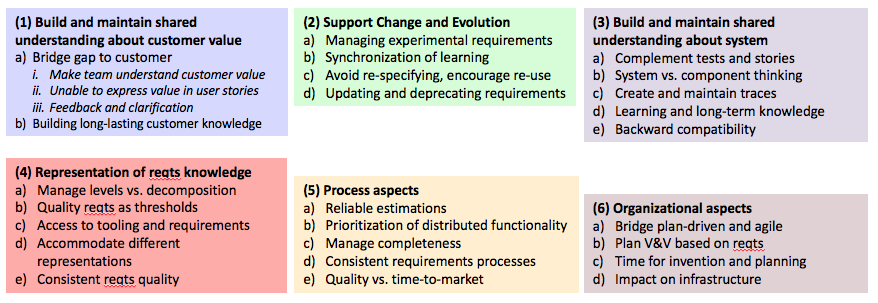We have identified the ability to manage requirements and related knowledge in continuous software engineering as a limiting factor with respect to the software center vision of accelerating software development. This project:
- Perceives Requirements Engineering as a Knowledge Management Problem in large-scale agile system development
- Provides a catalogue of challenges with managing requirements and related-knowledge in large-scale agile system development
- Supports defining and evolving large-scale agile processes and ways-of-working, e.g. by not over-optimizing a change with respect to one challenge, while forgetting others.
- Compiles a set of good and best practices to manage requirements and related knowledge
| Participating Researchers | Participating Companies |
|---|---|
|
|
Project Summary

The figure above shows an overview of the challenges we have compiled in this project. This project now aims to leave the analysis of the problem space and to explore the solution space. In Sprint 13, we started to prioritize the challenges above, but also collected good practices that promise to address these. We have provided first guidelines to manage system documentation in large-scale agile system development.
In Sprint 14, we have developed a set of guidelines and principles towards solutions for these challenges. Our key realizations include:
- A suitable requirements engineering strategy in the face of these challenges is context specific. Even within a company, different departments or even teams need specific support [WP+18] .
- New approaches to requirements engineering indeed allow for significant speed-up in fulfilling certain types of requirements [ÅK+18].
- Scaled agile frameworks such as SAFe and LeSS do not provide sufficient support for managing requirements-related knowledge.
- When deciding what to document, it is crucial to distinguish between boundary objects between teams and locally relevant documents [WP+18a,WP+18b].
- It is challenging but possible to develop safety critical systems based on continuous software engineering and agile approaches [KK+18].
Further, we have developed first approaches to allow strategic requirements engineering for APIs [HL+18], to allow developers to update requirements during agile sprints [KL+18], and to reason about new collaboration models with suppliers [VP+18].
Related publications
- [ÅK+18] Ågren, M.; Knauss, E.; Heldal, R.; Pellicione, P.; Malmqvist, G.; Boden, J.: The Manager Perspective on Requirements Impact on Automotive Systems Development Speed. In: Proceedings of 26th Int. Requirements Engineering Conf. (RE), Banff, Alberta, Canada, 2018
- [WP+18] Wohlrab, R.; Pellicione, P.; Knauss, E. and Gregory, S.: The Problem of Consolidating RE Practices at Scale: An Ethnographic Study. In: Proceedings of 24th Int. Working Conference on Requirements Engineering: Foundation for Requirements Engineering (REFSQ), Utrecht, The Netherlands, 2018
- [VP+18] van der Valk, R.; Pelliccione, P.; Lago, P.; Heldal, R.; Knauss, E. and Juul, J.: Transparency and Contracts: Continuous Integration and Delivery in the Automotive Ecosystem. Proceedings of 40th Int. Conference on Software Engineering (ICSE), SEIP Track, Gothenburg, Sweden, 2018
- [WP+18a] Rebekka Wohlrab, Patrizio Pelliccione, Eric Knauss and Mats Larsson: Boundary Objects in Agile Practices: Continuous Management of Systems Engineering Artifacts in the Automotive Domain. 40th Int. Conference on Software Engineering (ICSE), Poster Track, Gothenburg, Sweden, 2018
- [WP+18b] Wohlrab, R.; Pelliccione, P.; Knauss, E. & Larsson, M.: Boundary Objects in Agile Practices: Continuous Management of Systems Engineering Artifacts in the Automotive Domain (PDF). In: Proc. of Int. Conf. on Software and System Process (ICSSP), pp. 31-40, Gothenburg, Sweden, DOI: 10.1145/3202710.3203155, 2018
- [HL+18] Horkoff, J.; Lindmann, J.; Hammouda, I.; Knauss, E.; Debbiche, J.; Freiholtz, M.; Liao, P.; Mensah, S. & Strömberg, A.: Modeling Support for Strategic API Planning and Analysis. In: Proc. of Int. Conf. on Software Business (ICSOB), 2018
- [KK+18] Kasauli, R.; Knauss, E.; Kanagwa, B.; Nilsson, A. & Calikli, G.: Safety-Critical Systems and Agile Development: A Mapping Study. In: Proc. of Euromicro SEAA, 2018
- [KL+18] Knauss, E.; Liebel, G.; Horkoff, J.; Wohlrab, R.; Kasauli, R.; Lange, F. & Gildert, P.: T-Reqs: Tool Support for Managing Requirements in Large-Scale Agile System Development. In: Proceedings of 26th IEEE International Requirements Engineering Conference (RE’18), Demo Track, Banff, Canada, 2018
- Kasauli, R.; Liebel, G.; Knauss, E.; Gopakumar, S. & Kanagwa, B.: Requirements Engineering Challenges in Large-Scale Agile System Development. In: Proc. of 25th Int. Requirements Engineering Conf. (RE ’17), Lisbon, Portugal, 2017
- Eric Knauss, Grischa Liebel, Kurt Schneider, Jennifer Horkoff and Rashidah Kasauli: Quality Requirements in Agile as a Knowledge Management Problem: More than Just-in-Time. In: Proceedings of 2nd International Workshop on Just-In-Time Requirements Engineering: Dealing with Non-Functional Requirements in Agile Software Development (JITRE@RE), 2017
- Francisco Gomes de Oliveira Neto, Francisco and Jennifer Horkoff, Eric Knauss, Rashidah Kasauli, Grischa Liebel: Challenges of Aligning Requirements Engineering and System Testing in Large-Scale Agile: A Multiple Case Study. In: Proceedings of 4th International Workshop on Requirements Engineering and Testing (RET@RE), Lisbon, Portugal, 2017
- Mazen Mohamad, Grischa Liebel, Eric Knauss. Loco Coco: Automatically constructing coordination and communication networks from model-based systems engineering data. In: Information and Software Technology (IST), DOI: 10.1016/j.infsof.2017.08.002, 2017
- Kasauli, R.; Knauss, E.; Nilsson, A. & Klug, S.: Adding Value Every Sprint: A Case Study on Large-Scale Continuous Requirements Engineering. In: Proceedings of 3rd Workshop on Continuous Requirements Engineering (CRE@REFSQ), Essen, Germany, 2017
